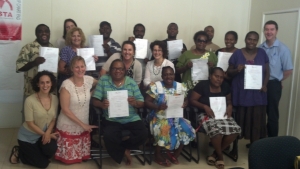Voices of Pacific Children with Disabilities
Research news
Pikinini tok tok as it is known in Vanuatu or Sing aut bilong pikinini in PNG refers to participatory research that is occurring in both countries. Sitting within ADRI, The Voices of Pacific Children with Disabilities research objectives are: Children with disabilities in Vanuatu and Papua New Guinea will be able self report their priorities, dreams and concerns through the development of sound methodology that is safe, respectful, accessible and able to capture the depth of data that children with disabilities can provide. Funded by the Australian Aid Development Research Awards Scheme in 2012, this research will provide invaluable data that can inform policy and practice for communities, governments and organisations. The project involves a multi-staged capacity building approach between PNG Assembly of Disabled Persons (PNGADP), Disability Promotion and Advocacy Association Vanuatu (DPA), Save the Children, and Deakin University.
Knowledge of the experiences of children with disabilities living in Vanuatu and PNG is limited and does not include data collected directly from children themselves. Disability is not often documented or diagnosed, there are few services and supports, and people with disability are routinely excluded. This project aims to establish a range of methods of data collection to determine the self-reported needs and priorities of children living with disabilities in Vanuatu and PNG.
2013 has been a busy year for the project with the development of methods of data collection to enable children to report their needs and dreams, as well as training of local researchers (including people with a disability). The first phase of the project has developed and trialled several different methods of communicating with children about their life needs and priorities including the use of dolls, a photo library and a sound library. The project has developed data collection tools and guides for their use in English and in local languages of Bislama (Vanuatu) and Tok Pisin (PNG). Along with the innovative tools for collecting data from children, the project has also worked on a Disability Identification Tool to enable researchers to easily document the nature of the child's impairment. Again, this tool has been translated into both languages, utilising the advice of local people with disabilities. This process has raised many issues about notions of disability - for example, how is intellectual disability understood and characterised in Vanuatu or PNG - along with some interesting dialogue about the way language both defines and constrains people with disability within cultures.
One of the most positive aspects of this project to date has been the significant involvement of people with disability in both countries, both as paid staff and volunteers. Training in both countries was heavily supported by the local disabled people’s organisations, with many self advocates with disabilities attending training as volunteers and providing valuable input around their lived experience of disability in each country. In this way, the project offers valuable lessons for developing partnerships with people in disability in developing countries.
Share this story
 Save The Children staff along with ADRI members Professor Matthew Clarke (end right), Elena Jenkin (centre, middle row) in Vanuatu upon completion of the research training, November 2013.
Save The Children staff along with ADRI members Professor Matthew Clarke (end right), Elena Jenkin (centre, middle row) in Vanuatu upon completion of the research training, November 2013.
